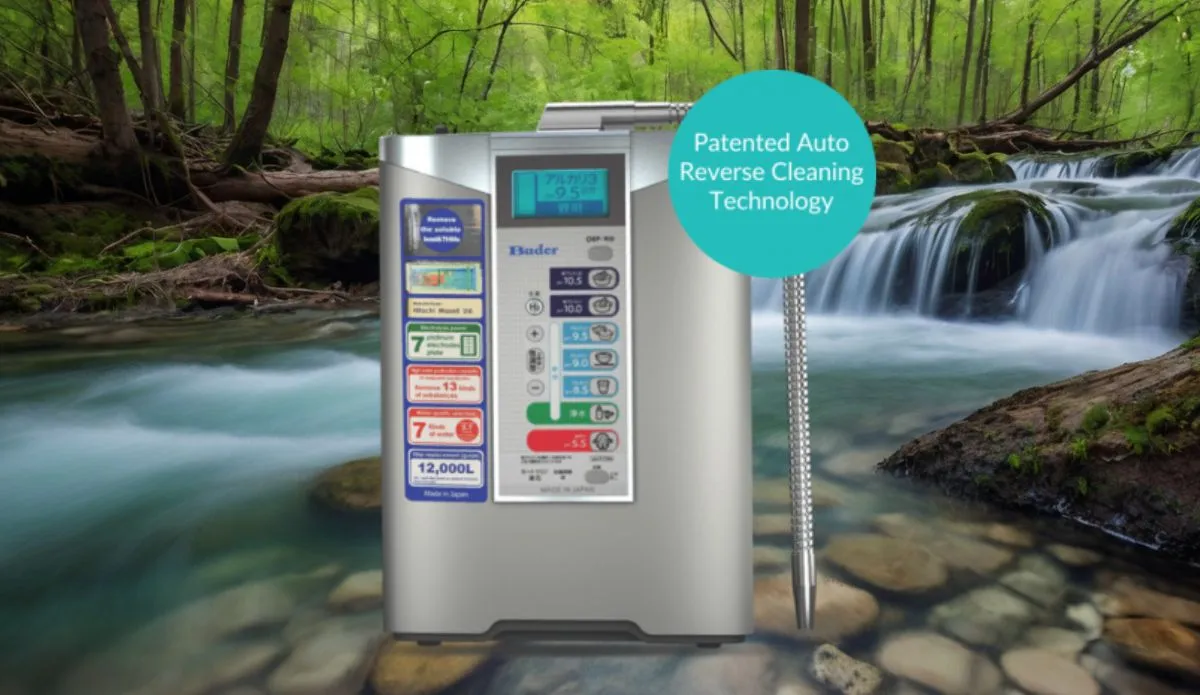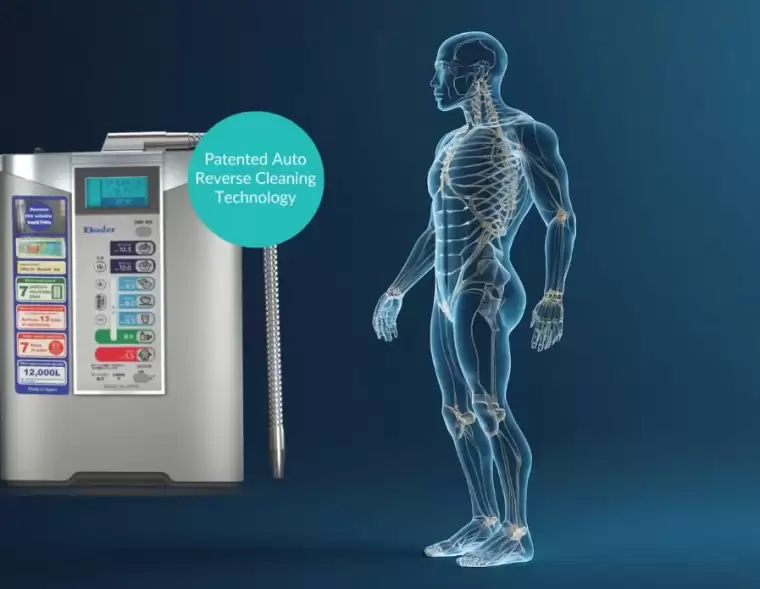Alkaline ionized water, celebrated for its potential to enhance health and well-being, is experiencing a surge in popularity. Yet, the intricate machines responsible for creating this specialized water alkaline ionizers remain shrouded in mystery for many. Join us on a journey into the heart of alkaline ionizer manufacturing plants, where science, engineering, and health converge.
The Inner Workings of an Alkaline Ionizer Manufacturing Plant
These cutting-edge facilities are where innovation meets meticulous craftsmanship. Let’s explore the key processes that transform raw materials into sophisticated water-altering devices:
1. Alkaline Ionizer Manufacturing Plant: Electrode Creation
- Material Mastery: The foundation of every ionizer lies in its electrodes. Titanium, renowned for its exceptional corrosion resistance and biocompatibility, is the material of choice. To elevate the electrolysis process, a thin layer of platinum is often applied. Platinum acts as a catalyst, facilitating the separation of water molecules into alkaline and acidic streams.
- Engineering Excellence: The creation of electrodes demands a symphony of precision engineering. Titanium sheets are meticulously cut into plates of the desired size and shape. Strategic holes are drilled to enable smooth water flow through the electrolysis chamber. The application of the platinum coating necessitates meticulous techniques like electroplating or sputtering, ensuring uniformity and optimal thickness.
- Maximizing Surface Area: The efficiency of electrolysis hinges on the available surface area of the electrodes. Engineers employ ingenious designs to maximize this area. Textured or porous surfaces, sometimes achieved through etching or laser ablation, expose a greater number of active sites for water molecule interaction, amplifying the ionization process.
- Quality Assurance at Every Step: Rigorous quality control measures permeate every stage of electrode production. Each electrode undergoes stringent testing to verify its composition, dimensions, electrical conductivity, and adherence to design specifications. Advanced microscopy and spectroscopy techniques may be employed to scrutinize the electrode surface for any imperfections.
2. Alkaline Ionizer Manufacturing Plant: Assembly and Calibration
- Electrolysis Chamber Design: The electrolysis chamber is the crucible where ordinary water undergoes its transformation. Its design is paramount. Efficient water flow must be ensured, preventing stagnation and promoting even contact with the electrodes. The chamber’s geometry is carefully optimized to facilitate the separation of alkaline and acidic water, minimizing cross-contamination.
- Harmonious Integration of Components: An ionizer is more than just electrodes. Filters play a crucial role in removing impurities from the incoming water, ensuring the purity of the final product. Tubing systems guide the water through the various stages of filtration and ionization. Electronic control units, often equipped with microprocessors, regulate pH and ORP levels, monitor water flow, and provide user feedback.
- The Art of Calibration: After assembly, the ionizer undergoes a meticulous calibration process. Standard solutions with known pH and ORP values are used to fine-tune the electronic controls. This ensures that the ionizer consistently produces water with the desired characteristics, aligning with the user’s preferences and health goals.
- The Rise of Smart Ionizers: The advent of the Internet of Things (IoT) has ushered in a new era of “smart” ionizers. These devices boast connectivity features that enable them to interact with smartphones or home automation systems. Users can remotely monitor water quality, receive alerts for filter replacements, and even customize pH and ORP settings with a few taps on their screens.
3. Alkaline Ionizer Manufacturing Plant: Quality Control and Testing
- Multifaceted Testing Protocols: Alkaline ionizers are subjected to a battery of tests throughout the manufacturing process. Leak tests verify the integrity of the chamber and tubing. Electrical safety checks ensure compliance with regulatory standards. Performance tests assess the ionizer’s ability to produce water with the desired pH and ORP levels under varying conditions, such as different source water qualities and flow rates.
- Endurance Under Scrutiny: To simulate real-world usage, ionizers undergo endurance testing. They are operated continuously for extended periods to evaluate the durability of components, detect potential wear and tear, and identify any areas for improvement. This helps manufacturers refine their designs and enhance the longevity of their products.
- Seeking External Validation: To bolster consumer confidence, leading manufacturers often subject their ionizers to independent testing and certification. Organizations like the Water Quality Association (WQA) and NSF International offer certification programs that assess the performance, safety, and material quality of water treatment devices. These certifications provide reassurance to consumers that the ionizer they choose meets rigorous standards.
- Harnessing the Power of User Feedback: Manufacturers actively collect feedback from users to gain insights into real-world experiences. This feedback loop allows them to identify potential issues, gather suggestions for improvements, and refine their products over time. By listening to the voices of their customers, manufacturers can continually elevate the quality and user-friendliness of their ionizers.
4. Alkaline Ionizer Manufacturing Plant: Research and Development
- Electrode Innovation: The quest for the perfect electrode material continues. Researchers are exploring novel materials like mixed metal oxides and nanostructured coatings to enhance the efficiency and longevity of electrodes. Some are even investigating the use of renewable energy sources like solar power to drive the electrolysis process, reducing the environmental footprint of ionizers.
- Smart Ionizers: The Next Frontier: The integration of artificial intelligence (AI) and machine learning (ML) is poised to revolutionize the world of alkaline ionizers. AI-powered ionizers could analyze water quality data in real-time, adjusting their settings dynamically to optimize performance. They could even learn the user’s preferences and tailor water output accordingly.
- Energy Efficiency and Sustainability: As environmental consciousness grows, manufacturers are striving to make alkaline ionizers more energy-efficient. This involves optimizing the electrolysis process, reducing standby power consumption, and using eco-friendly materials in construction. Some are even exploring the integration of ionizers with rainwater harvesting systems to create a closed-loop water purification solution.
- Beyond the Kitchen Counter: While most ionizers are designed for home use, the future may hold more versatile options. Portable ionizers could make alkaline water accessible in workplaces, gyms, or even outdoor adventures. Imagine a compact ionizer that attaches to a water bottle, providing on-the-go alkaline hydration.
The Consumer’s Guide to Choosing the Right Alkaline Ionizer
The array of alkaline ionizers on the market can be overwhelming. To make an informed decision, consider the following factors:
- Number of Electrolysis Plates: More plates typically translate to stronger ionization and higher pH and ORP levels in the water.
- Filter Quality: A high-quality filter is essential for removing impurities and ensuring the purity of the alkaline water. Look for filters that are certified by reputable organizations like the NSF.
- Warranty and Customer Support: A comprehensive warranty and responsive customer support can provide peace of mind and ensure that your ionizer remains in top working condition.
- Additional Features: Some ionizers offer features like self-cleaning cycles, automatic pH adjustment, voice prompts, and even the ability to produce acidic water for cleaning or skincare. Choose features that align with your needs and preferences.
- Brand Reputation: Research different brands, read reviews, and choose a manufacturer with a proven track record of quality and customer satisfaction.
In Conclusion: The Future of Alkaline Water is Bright
Alkaline ionizer manufacturing plants are at the forefront of a burgeoning industry. They are where scientific ingenuity and meticulous craftsmanship converge to create devices that empower individuals to take control of their health and well-being. As research continues to shed light on the potential benefits of alkaline water, the future of this technology appears promising. With ongoing innovation and a focus on quality, alkaline ionizers are poised to become an indispensable tool for health-conscious individuals worldwide.



